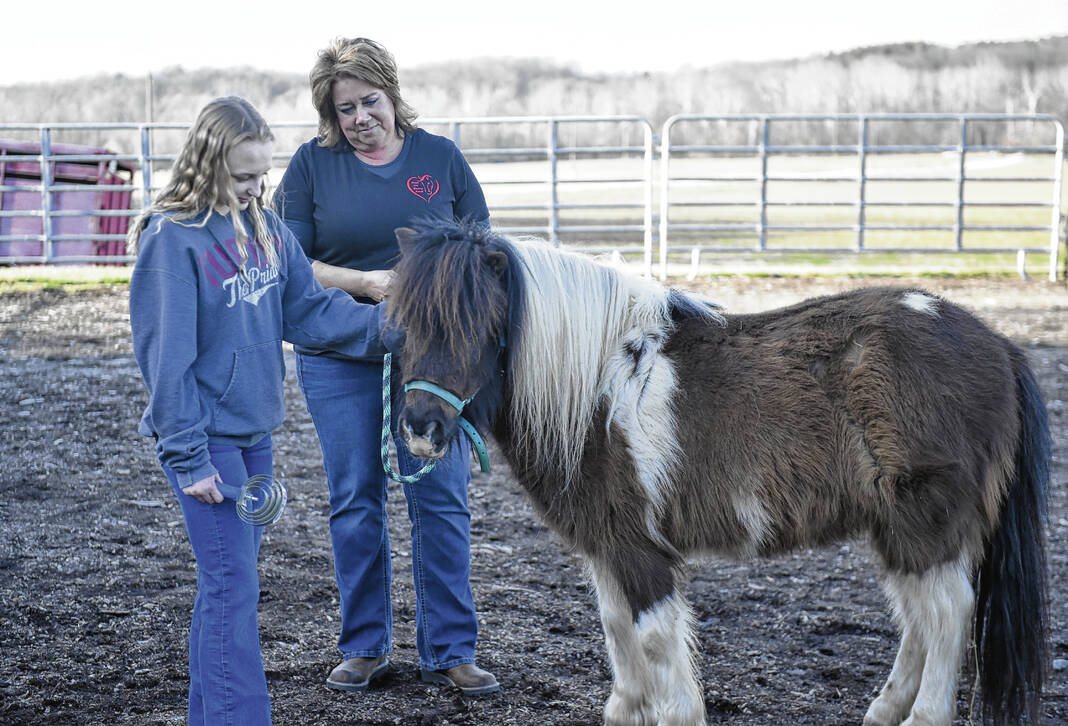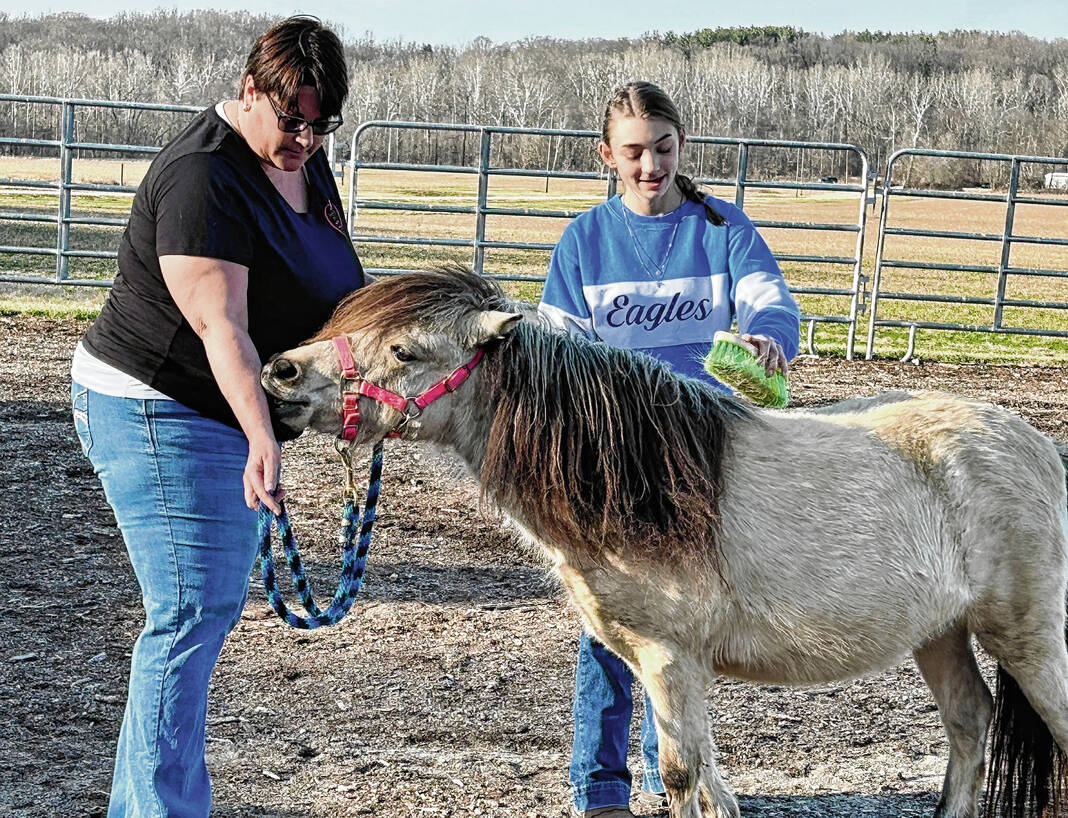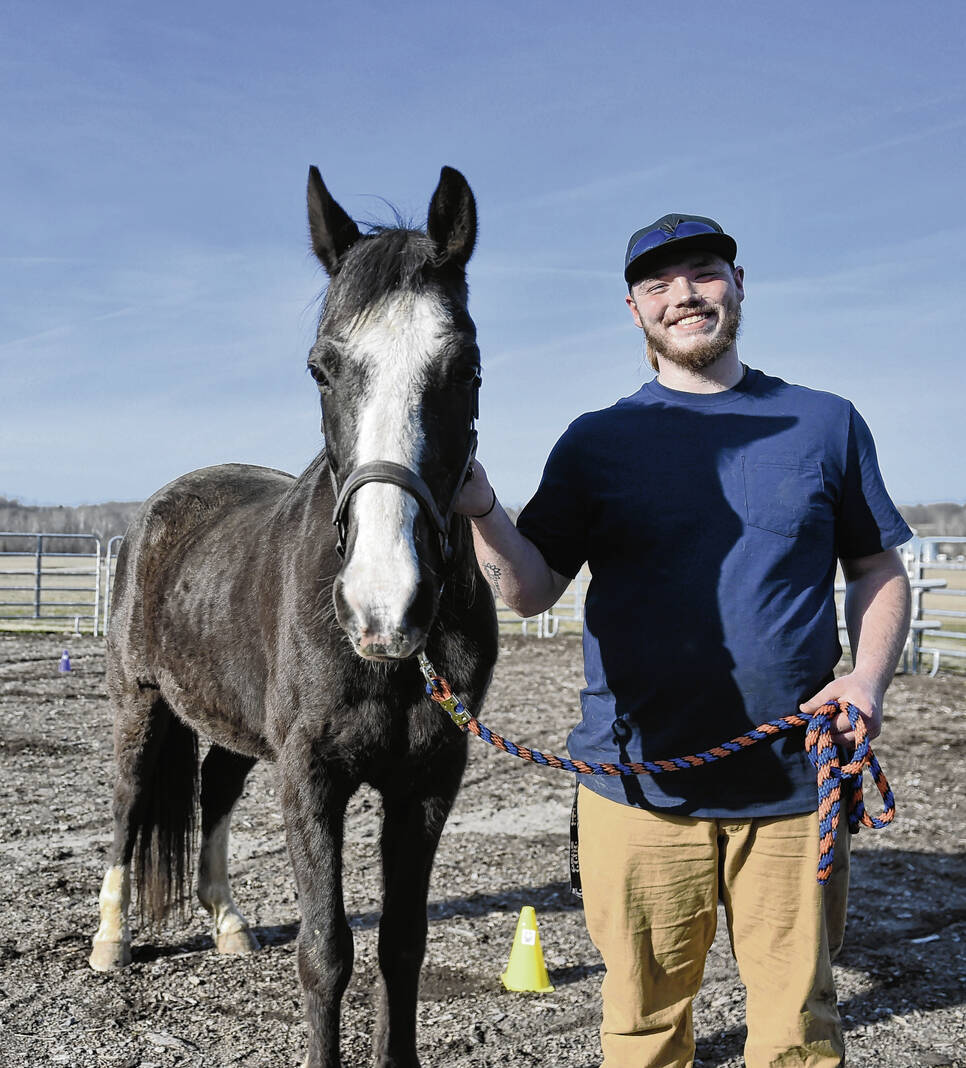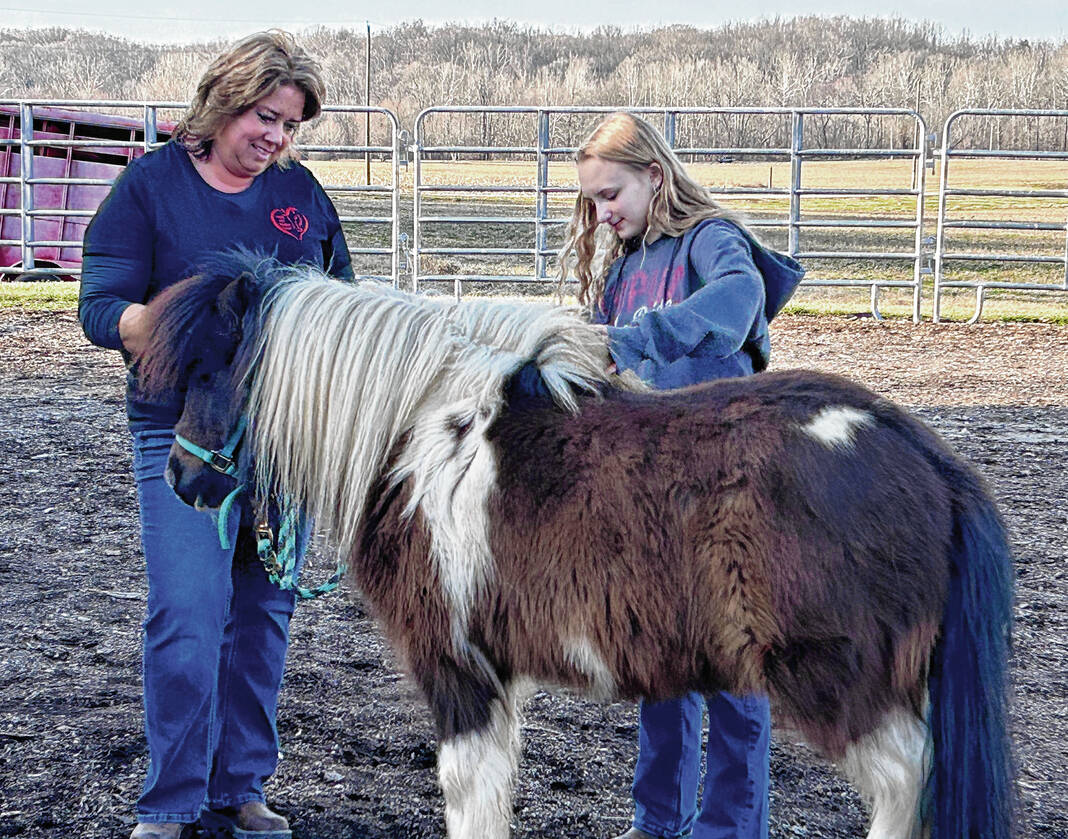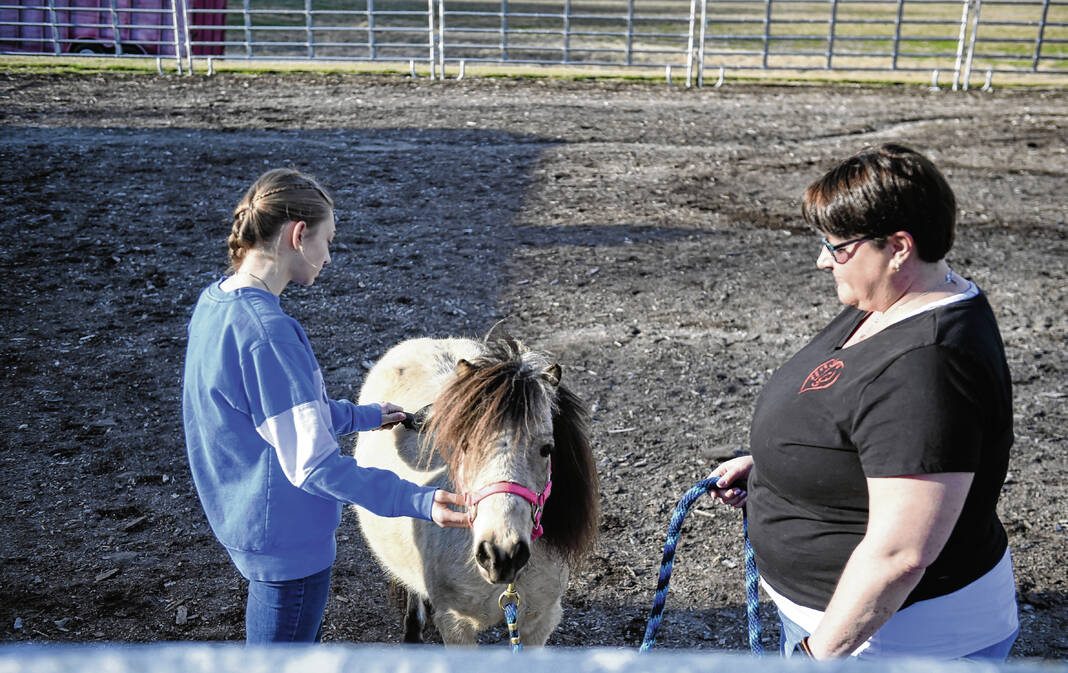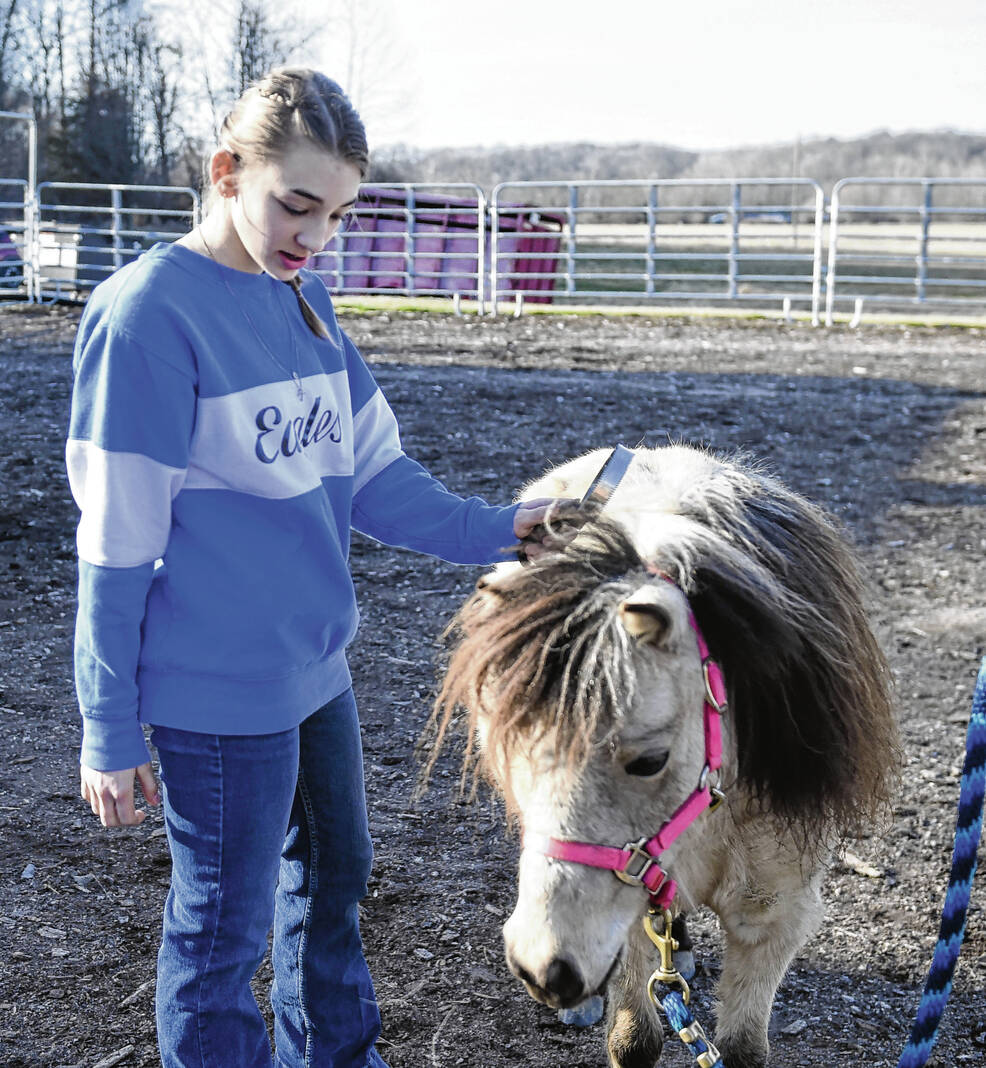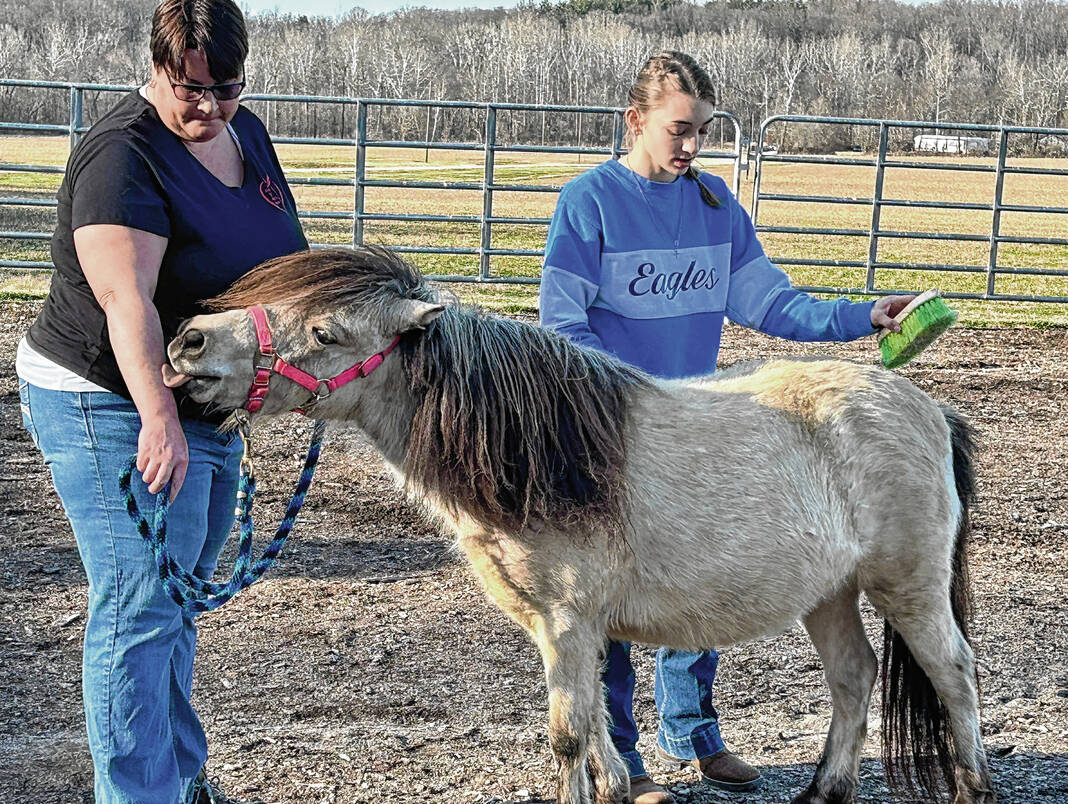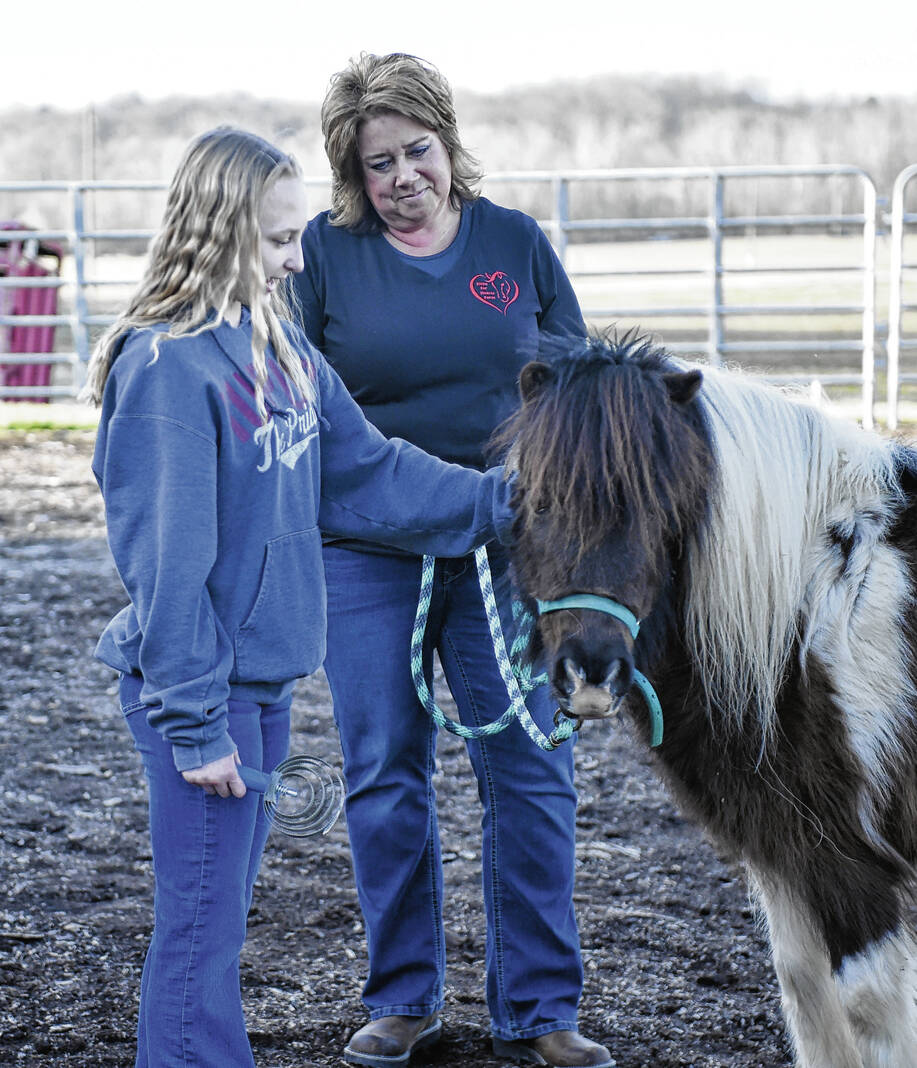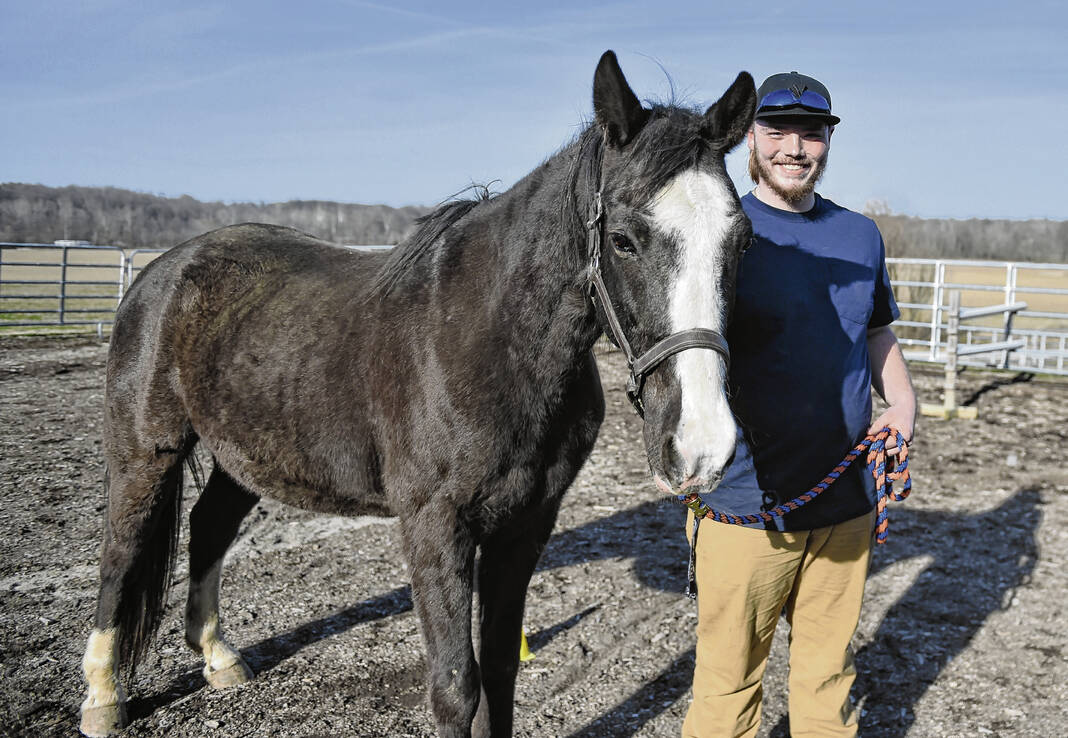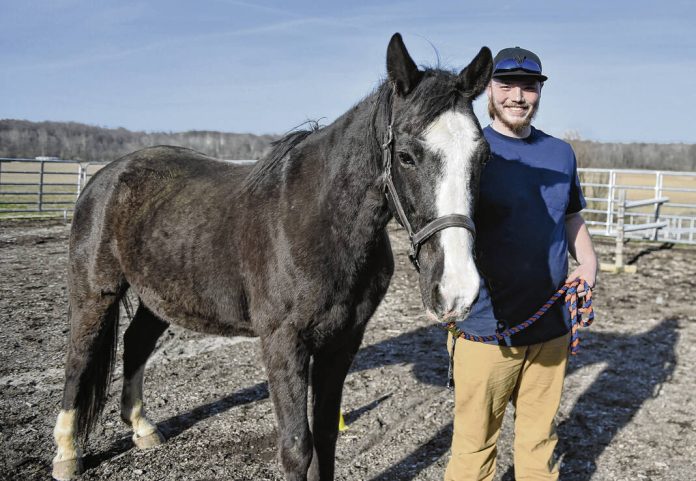
Wyatt Barnett of Brown County works with Rizzo, one of the horses at Hope for Hearts Horse Farm located south of Morgantown on Feb. 26. Hope for Hearts is a non-profit, equine-assisted learning program using goal based, non-riding activities with horses to help with a variety of behavioral and emotional issues.
RYAN TRARES | DAILY JOURNAL
The massive yet gentle black-and-white horse seemed to make the pain subside with each step it took.
Wyatt Barnett held on to the reins, leading a horse named Rizzo around the corral at Hope for Hearts Horse Farm. The Brown County resident had come to the farm roiling in loss; in quick succession, his father and best friend had died.
Barnett’s friend knew he needed help dealing with the losses. He suggested working for horses could help, and Barnett took the advice.
“I was going through a rough time, but being able to come here, talk through my emotions, be with the horse, has helped me a lot,” he said. “The days are not so hard anymore. It’s a work in progress, but it’s definitely getting better.”
For the past 11 years, people such as Barnett have been coming to Hope for Hearts searching for healing. The nonprofit equine-assisted learning program offers activities with horses to provide insight about their thoughts, beliefs and patterns of behavior.
No horseback riding is involved; rather, participants come to the farm just south of Morgantown to take part in a variety of tested and proven activities designed to regulate and stabilize emotions, manage stress, build confidence and self-esteem, develop relationship skills and practice self-care.
“We’ve so many people with so much progress. The way the horses react to these individuals, you can tell that they care, that they want to help,” said Emily Wallach, a trained facilitator at the farm. “It’s an amazing journey to witness and be a part of.”
The sessions have proven beneficial for people of all ages dealing with different issues, from stress to grief to trauma to behavioral or emotional control issues.
From the horses’ innate ability to discern thoughts, feelings and behaviors, participants are given immediate and honest feedback from the animals, which mirror those feelings and behaviors they sense, said Lisa Bowman, founder of Hope for Hearts.
“They’re very intuitive, so they pick up what someone is thinking, feeling, believing on the inside. It doesn’t matter how confident they appear on the outside; if they’re questioning things, or doubting themselves, that’s what the horse is going to reflect,” she said.
Bowman first became involved in equine-assisted learning programs years ago. Her daughter had a love of horses, and they found a place near their home at the time in Monrovia where she could ride. Bowman started working at the farm a few days a week to help with the animals and get ready for lessons.
After going through a difficult period that “shattered my self-esteem,” Bowman said, she saw how the horses could help her gain confidence.
“The Lord laid it on my heart to help others then, so we sold our house and ended up down here in Brown County,” she said.
By April of 2013, Hope for Hearts Farm was up and going. Bowman’s goal was to create a program to help other’s find hope.
“A lot of times, when people come here, they’re feeling very disconnected, either in the relationships or their professional career. So the horses help them find clarity in that,” she said.
Many of the participants at Hope for Hearts are children. The facility works with kids ages 8 and up, helping them grow in their confidence, focus, communication and relationship skills as well as learning appropriate ways to control emotions and behaviors.
Research backs up the success of pairing young people with horses. In 2013, Washington State University conducted a study of students in fifth through eighth grade involved in equine-assisted learning. The study found that those students demonstrated an increase in social competence and positive behavior among the participants, with particular improvement in self-awareness and self-management.
When Erika Bryenton learned about Hope for Hearts through a Brown County leadership program, she immediately thought it could help her oldest daughter, Awna. She was struggling in school, and Bryenton felt it could be beneficial helping her in relationships with other kids.
Four years later, it’s proven to be a success.
“It has made a big difference in her controlling her emotions and her reactions to things,” Bryenton said.
Awna has felt herself change.
“It’s helped me a lot, and I like working with horses,” said Awna, now 14 years old. “Rosie (one of the horses) helped me better myself and how I act — to express myself better. Dixie (another horse) is helping me be stronger and more of a leader, since she’s definitely one to fight back, so I have to try a lot more with her.”
Awna now comes for regular sessions with her sister, Bristol, 13.
“I’ve found I really enjoy interacting with the horses, how they help me with things,” Bristol said. “Rosie helps me throw out negative thoughts and replace them with positive thoughts.”
Hope for Hearts has also started offering horse-powered reading — a program that uses the animals to help kids learn to read.
“It’s everything from learning the alphabet by matching letters to the horses’ names on their stalls, to working with multi-syllable words,” Bowman said. “You’re watching the horse’s behavior, because that gives an indication about those limiting results they might have with reading.”
To track the impact and effectiveness of the program, Hope for Hearts tracks outcomes over the course of the year to reveal if equine-assisted learning is working, both for kids and adults. They’ve seen drastic increases in peoples’ level of self-confidence, the ability to focus, initiative to try new things and the ability to work with other people, among other things.
Health indicators, such as pulse, blood pressure and stress levels, also improve by working with the horses.
“Over 90% of people had lowering of their pulse, blood pressure and respirations, and 100% of people had lowering of their stress levels,” Bowman said.
A new offering at Hope for Hearts is aimed at groups of adults. Journey to Leadership allows businesses to sign up for sessions with their employees, completing experiential activities with the horses to learn leadership, team building and group dynamics.
An assessment conducted before the session lets businesses tailor the activities for the challenges facing their team, and Hope for Hearts facilitators follow-up afterward to address.
“Then when they leave the farm, they have an action plan for them to implement,” Bowman said. “We’ll follow-up about 60 days later to see what results they’re seeing from the changes they made after working with the horses.”
Hope for Hearts Farm continues to grow and explore new activities and programs to offer. But those involved with the farm, whether facilitators or volunteers, plan to keep focusing on the mission that had defined Hope for Hearts for 11 years — helping people who need it.
“Every day is a blessing. To be able to see someone come in, and then leave with skills they learned from that horse that will help them grow as a person or as a leader — we’re changing lives here,” Bowman said.
AT A GLANCE
Hope for Hearts Horse Farm
What: A non-profit, equine-assisted learning program using goal-based, non-riding activities with horses to provide insight about thoughts, beliefs and patterns of behavior.
Who: Founded by Lisa Bowman
When: 2013
Where: 1001 W. SR 45, Morgantown
How to sign up: Contact Bowman at 317-496-0189.
Information: hopeforheartsfarm.org


